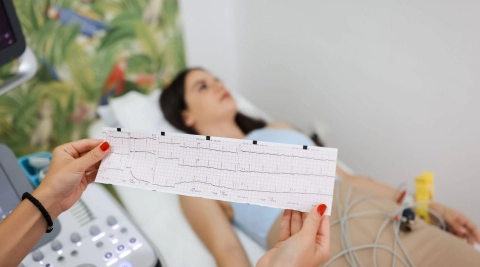Conditions Atrioventricular block (AV block)
ICD codes: I44 What are ICD codes?
A cardiac arrhythmia (heart rhythm disorder) such as AV block is one possible reason for the heart to beat very slowly. AV block is caused by an impairment in the conduction (transmission) of electrical impulses (signals) in the heart. The symptoms may be made worse by any pre-existing conditions that place additional strain on the heart.
At a glance
- An atrioventricular block (AV block) is a cardiac arrhythmia or heart rhythm disorder which is caused by impaired conduction (transmission) of electrical impulses in the heart.
- A mild AV block often goes unnoticed.
- With a severe AV block, however, the heart beats much too slowly, resulting in symptoms such as dizziness, weakness and fainting.
- People who experience these symptoms usually get a pacemaker.
- This is a device that ensures that the heart beats as fast as it needs to.
Note: The information in this article cannot and should not replace a medical consultation and must not be used for self-diagnosis or treatment.

What is AV block?
There may be many reasons for the heart to beat slowly. One of these is cardiac arrhythmia (heart rhythm disorder) called AV block (atrioventricular block). This disorder is due to an impairment in the transmission of electrical impulses from the atria (upper chambers) to the ventricles (lower chambers) in the heart via the AV node (atrioventricular node).
The sinus node (SA node) normally regulates cardiac rhythm. As the heart’s natural pacemaker, it generates electrical signals known as impulses in the right upper chamber of the heart (right atrium), which are transmitted in waves and travel to the lower chambers (ventricles) via the AV node. If an AV block is present, it interferes with the transmission of impulses to the ventricles. This disorder is divided into three degrees of severity:
Grade 1 AV block
The transmission of impulses to the ventricles is delayed. However, the cardiac rhythm is preserved and the heartbeat is not slowed.
Grade 2 AV block
The transmission of impulses is occasionally disrupted. Some impulses no longer reach the ventricles and the heart frequently skips or drops beats.
Grade 3 AV block
Signal transmission is completely blocked (complete AV block) and the impulses no longer reach the ventricles. In this case, substitute impulses in the ventricles prevent the heart from stopping. The heartbeat slows to fewer than 40 beats per minute (bradycardia). People with this most severe form require a cardiac pacemaker.
Video How does the heart function?
This video provides more information about the function and role of the heart.
This and other videos can also be found on YouTube
Watch nowThe privacy policy indicated there applies.
What are the symptoms of AV block?
The symptoms depend on the severity of the AV block and whether there are any pre-existing conditions that are placing additional strain on the heart or have already caused damage to it. The AV block may also be temporary.
Grade 1 AV block
People with mild AV block and no pre-existing conditions often do not even realize that they have the disorder, as they frequently have no symptoms.
Grade 2 AV block
Symptoms such as heart palpitations, racing heartbeat, weakness, and dizziness are common. Breathlessness, chest pain, or fainting (syncope) are particularly likely to occur during physical exertion or mental stress.
Grade 3 AV block
The heartbeat is significantly slowed. The symptoms described may also occur during periods of rest and are experienced as soon as the disordered heart rhythm occurs. Fluid may build up in the tissue in the lower legs, causing swelling (edema).
What are the causes of AV block?
AV block has many different triggers. It is among the possible side-effects of some types of medication, such as certain heart medication. In addition, hormone disorders, auto-immune diseases, and infectious diseases (e.g., Lyme disease or borreliosis) can affect the heart’s transmission of electrical impulses.
A severe, permanent AV block is usually caused by a heart disease. Examples of heart diseases include a congenital heart defect, myocarditis (inflammation of the heart muscle) and coronary heart disease (CHD). Some risk factors for coronary heart disease, such as advanced age, obesity, high blood pressure, or diabetes, also increase the likelihood of developing an AV block.
Some athletes experience a mild form of AV block during periods of rest – however, this is not considered abnormal.
How common is atrioventricular block?
AV block is one of the more common forms of heart disease. However, it is difficult to estimate how many people are affected.
AV block can be a temporary or permanent condition. While milder degrees of the disorder are more common among young people, older people tend to be affected by a more severe form.
How does AV block progress?
A mild AV block may temporarily disappear during physical exhaustion when the pulse is increased, only to return during periods of rest.
Sometimes, mild AV block develops into severe AV block.
If heart disease is the cause of this impairment, it will usually become a permanent condition.
Even a severe AV block may disappear if the cause can be eliminated – for example, if the person stops taking medication that is triggering the arrhythmia.
How is AV block diagnosed?
In some people, AV block is more likely to be discovered when skipped beats or a very slow heartbeat are detected when a doctor takes the pulse or listens to the heart. An electrocardiogram (ECG) is required to confirm a potential AV block as well as its degree of severity. Occasionally, additional specific ECG examinations need to be conducted also, e.g., a stress test or a long-term ECG wearing a portable monitor.
In most cases, further tests are required to ascertain the causes of the AV block and to test whether the heart has been weakened. These include an ultrasound examination of the heart (echocardiogram) or heart catheterization.
How is AV block treated?
The treatment for AV block depends above all on the severity of the symptoms. Frequently, mild AV block requires no treatment at all. In contrast, severe AV block normally requires pacemaker implantation. Medications (e.g., atropine) that accelerate the heartbeat are usually only administered in the event of an emergency.
Pacemakers can be used on a temporary or permanent basis to regulate the heartbeat. They cannot cure the disorder itself. This is why treatment usually aims to treat the causes instead.
For more detailed information about AV block, visit gesundheitsinformation.de.
What is everyday life like with AV block?
For people with a severe form of AV block, symptoms such as breathlessness and weakness may become a strain. This is often exacerbated by a fear of losing consciousness and life-threatening effects.
The disorder can be life-altering, even with a pacemaker. People have to become accustomed to regular follow-up examinations and must always carry a pacemaker ID card with them. Some people find it upsetting that the device is visible under the skin. However, most people gradually become used to it.
Where can I find more information?
It is very important for those who require a pacemaker to get advice. Doctors can provide detailed advice and guidance for everyday life. Information is also available from health insurance providers.
If a doctor recommends a pacemaker, it may be helpful for the patient to complete a form known as a decision aid. This resource is available from gesundheitsinformation.de.
- Deutsche Gesellschaft für Kardiologie (DGK). Pocket-Leitlinie: Schrittmacher- und kardiale Resynchronisationstherapie. 2021. Aufgerufen am 09.06.2023
- Glikson M, Nielsen JC, Kronborg MB et al. ESC Guidelines on cardiac pacing and cardiac resynchronization therapy. Europace. 2022 Jan 4;24(1):71-164.
- Kasper DL, Fauci AS, Hauser SL, Longo DL, Jameson JL, Loscalzo J. Harrison's Principles of Internal Medicine. McGraw-Hill: New York 2015.
- Kusumoto FM, Schoenfeld MH, Barrett C et al. 2018 ACC/AHA/HRS guideline on the evaluation and management of patients with bradycardia and cardiac conduction delay: A Report of the American College of Cardiology/American Heart Association Task Force on Clinical Practice Guidelines and the Heart Rhythm Society. Heart Rhythm. 2019 Sep;16(9):e128-e226.
- Malm D, Hallberg LR. Patients' experiences of daily living with a pacemaker: a grounded theory study. J Health Psychol 2006.11(5): 787-798. Aufgerufen am 29.04.2020.
- Munawar DA, Chan JEZ, Emami M et al. Magnetic resonance imaging in non-conditional pacemakers and implantable cardioverter-defibrillators: a systematic review and meta-analysis. Europace. 2020 Feb 1;22(2):288-298.
- Napp A, Kolb C, Lennerz C et al. Elektromagnetische Interferenz von aktiven Herzrhythmusimplantaten im Alltag und im beruflichen Umfeld. Stellungnahme der Deutschen Gesellschaft für Kardiologie (DGK) und der Deutschen Gesellschaft für Arbeitsmedizin und Umweltmedizin (DGAUM). Kardiologe 2019; 13: 216-235.
- Sommer T, Bauer W, Fischbach K, Kolb C, Luechinger R, Wiegand U et al. MR-Untersuchungen bei Patienten mit Herzschrittmachern und implantierbaren Kardioverter-Defibrillatoren. Konsensuspapier der Deutschen Gesellschaft für Kardiologie (DGK) und der Deutschen Röntgengesellschaft (DRG). Kardiologe 2017. 11: 97-113. Aufgerufen am 09.06.2023
- von Knobelsdorff-Brenkenhoff, F., Bauer, W.R. et al. Empfehlungen zu kardialen MRT-Untersuchungen bei Patienten mit Herzschrittmachern und implantierbaren Kardioverter-Defibrillatoren. Kardiologe 13, 75–86 (2019).
In cooperation with the Institute for Quality and Efficiency in Health Care (Institut für Qualität und Wirtschaftlichkeit im Gesundheitswesen) (IQWiG).
As at:





